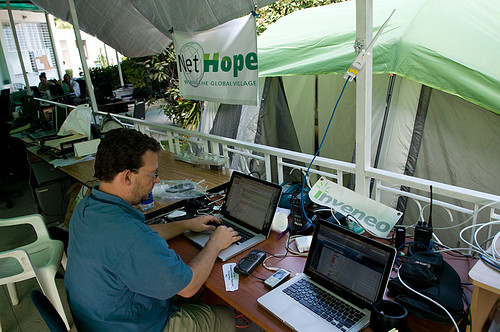
An rural Indian farmer at an E-Choupal
The agriculture industry is imperative in India. The country ranks second worldwide in its farming output, agriculture allotted 16.6% of the country’s GDP in 2007 and employed 52% of the total workforce. Yet most Indian farmers remained impoverished. The origins of this problem stem from the archaic government regulation called the Agriculture Produce Marketing Committee (APMC) Act. Created in the 1960s, the APMC Act founded that agri-companies, like ITC, could only buy agricultural produce through designated markets called mandis where they would have to buy from registered commission agents. Once the crop was harvested, farmers would take their produce to the mandis where their produce would be auctioned by commissioned agents. Since the agent was the only channel between the farmer and the processor, agents would typically auction off multiple lots before taking it to the processor. Thereby ensuring no price or quality transparency in this farm-to-factory cycle. Since the mandis were a formidable distance from the fields, farmers would have to accept the price offered them at auctions on the day that they bring their harvest to the mandi. As a result, traders are well positioned to exploit both farmers and buyers through practices that maintain system-wide inefficiencies and pocket additional differences in price.
Incorporated in 1910, ITC is one of India’s leading private sector companies with a market capitalization of nearly US$18 billion, an annual turnover of US$4.75 billion. Rated one of the “World’s Best Big Companies” and “World’s most reputable companies” by Forbes magazine, ITC has business interests in tobacco, hotels, agri-business, retail, information technology, and others. The company founded its first E-Choupal site in June 2000, where they created Internet kiosks in rural farming villages to create an “improved supply chain”, directly connecting themselves and the farmers. The e-Choupals serve as both a social gathering place, choupal means gathering place in Hindi, to exchange information and an e-commerce hub. What began as an effort to re-engineer the system of processing and acquiring soybean meal, rice food grains, wheat, lentils, and coffee in rural India also created a highly profitable distribution and product design channel for the company. An e-commerce platform that is also a low-cost, mutually beneficial system focused on the needs of rural India.
In addition to the farmers only using the e-Choupal there is also a host farmer, called a sanchalak, who acquires some operating costs and is obligated to serve the entire community; the sanchalak benefits from increased esteem in the community and a commission paid him for all e-Choupal transactions. The farmers can use the Internet kiosks for daily access to closing prices on local mandis, as well as to track global price trends or find information about the weather and new farming techniques.

The rural farmers can also use the e-Choupal to order seed, fertilizer, and other farming products such as consumer goods from ITC or its partners, at prices lower than those available from village traders. When it is time to harvest the crops, ITC offers to buy the crop directly from any farmer at the previous day’s closing price and then the farmer transports his crop to an ITC processing center known as Choupal Saagars. Choupal Saagars are alternatives to the traditional mandis, catering to about 40 e-Choupals and are all within tractor driving distances. The crop is then weighed electronically and assessed for quality, and the farmer is paid for the crop along with a transport fee. Through this new process, farmers benefit from a more accurate weighing, quicker processing, and immediate payment. Further, the access to a wide range of information, including precise market price knowledge and market trends, assists them in deciding when, where, and at what price to sell.
Though the e-Choupal system serves as a catalyst for rural transformation, alleviating rural seclusion, cultivating transparency for farmers, and enhancing their productivity and incomes, there were still some core problems like education, health care, and insurances, which still eluded the farmer. Governmental system inefficiencies have long kept farmers in an economic hiatus, and companies in the agrarian society struggled to find a balance between their social and shareholder obligations. However, with the e-Choupal system, ITC had a model that created a unification of their seemingly oppositional needs.
The e-Choupal program converged with ITC’s corporate social responsibility initiative to act upon objectives to help the community they were working in. Through their e-Choupals, ITC created Supplementary Learning Centers to help with rural India’s primary education, empowered women to become part of the global marketplace, and developed a three-tier Choupal Health Care model to cultivate the installation and delivery of both preventative and curative healthcare services. In addition, they also generated a full scale retail marketplace in the Choupal Saagars to the rural population and created financial product marketing for the farmers and their families where ITC offers to sell credit through their network. The Kisan Credit Card, third party loans, and channel credit allowed farmers to establish a better established infrastructure which drove down certain aspects of cost and improved the quality of their crops. Weather insurance, life insurance, along with pension and disability incomes were also established for farmers to have for themselves and their families just in case disaster struck.

One of the retail Choupal Saagars
The e-Choupal system lets farmers be more lenient with their choices, gives them a higher profit margin on their crops, and access to information that improves their productivity. By providing a more transparent process and empowering local people as key nodes in the system, ITC heightens trust and fairness. Critical factors in the success of the venture are ITC’s extensive knowledge of agriculture, the effort ITC has made to retain many original aspects of the existing production system, including maintaining relationships with local partners, ITC’s continued commitment to transparency, and the treating the farmers and local partners with respect and equality.
Sources: CIA World Factbook- India















































